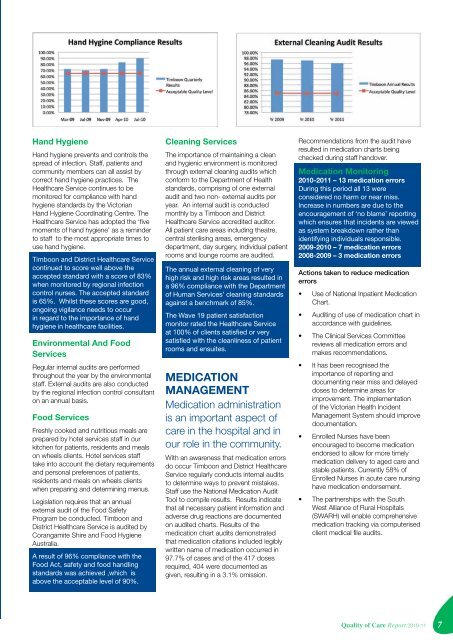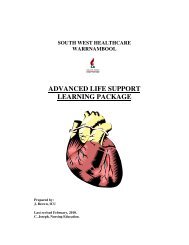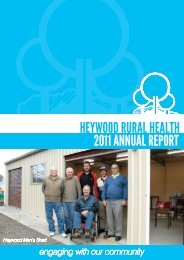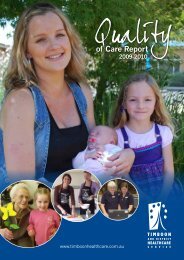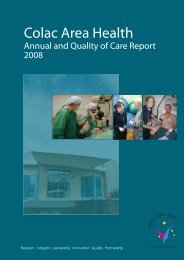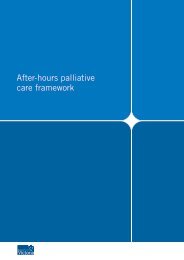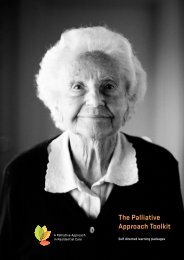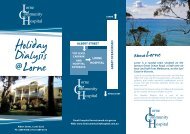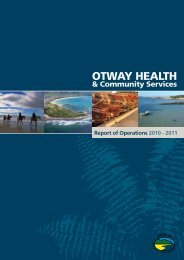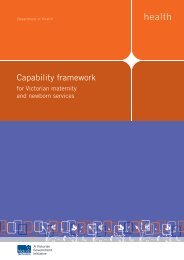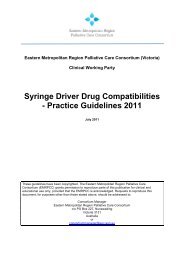Download - South West Alliance of Rural Health
Download - South West Alliance of Rural Health
Download - South West Alliance of Rural Health
You also want an ePaper? Increase the reach of your titles
YUMPU automatically turns print PDFs into web optimized ePapers that Google loves.
Hand Hygiene<br />
Hand hygiene prevents and controls the<br />
spread <strong>of</strong> infection. Staff, patients and<br />
community members can all assist by<br />
correct hand hygiene practices. The<br />
<strong>Health</strong>care Service continues to be<br />
monitored for compliance with hand<br />
hygiene standards by the Victorian<br />
Hand Hygiene Coordinating Centre. The<br />
<strong>Health</strong>care Service has adopted the ‘five<br />
moments <strong>of</strong> hand hygiene’ as a reminder<br />
to staff to the most appropriate times to<br />
use hand hygiene.<br />
Timboon and District <strong>Health</strong>care Service<br />
continued to score well above the<br />
accepted standard with a score <strong>of</strong> 83%<br />
when monitored by regional infection<br />
control nurses. The accepted standard<br />
is 65%. Whilst these scores are good,<br />
ongoing vigilance needs to occur<br />
in regard to the importance <strong>of</strong> hand<br />
hygiene in healthcare facilities.<br />
Environmental And Food<br />
Services<br />
Regular internal audits are performed<br />
throughout the year by the environmental<br />
staff. External audits are also conducted<br />
by the regional infection control consultant<br />
on an annual basis.<br />
Food Services<br />
Freshly cooked and nutritious meals are<br />
prepared by hotel services staff in our<br />
kitchen for patients, residents and meals<br />
on wheels clients. Hotel services staff<br />
take into account the dietary requirements<br />
and personal preferences <strong>of</strong> patients,<br />
residents and meals on wheels clients<br />
when preparing and determining menus.<br />
Legislation requires that an annual<br />
external audit <strong>of</strong> the Food Safety<br />
Program be conducted. Timboon and<br />
District <strong>Health</strong>care Service is audited by<br />
Corangamite Shire and Food Hygiene<br />
Australia.<br />
A result <strong>of</strong> 96% compliance with the<br />
Food Act, safety and food handling<br />
standards was achieved ,which is<br />
above the acceptable level <strong>of</strong> 90%.<br />
Cleaning Services<br />
The importance <strong>of</strong> maintaining a clean<br />
and hygienic environment is monitored<br />
through external cleaning audits which<br />
conform to the Department <strong>of</strong> <strong>Health</strong><br />
standards, comprising <strong>of</strong> one external<br />
audit and two non- external audits per<br />
year. An internal audit is conducted<br />
monthly by a Timboon and District<br />
<strong>Health</strong>care Service accredited auditor.<br />
All patient care areas including theatre,<br />
central sterilising areas, emergency<br />
department, day surgery, individual patient<br />
rooms and lounge rooms are audited.<br />
The annual external cleaning <strong>of</strong> very<br />
high risk and high risk areas resulted in<br />
a 96% compliance with the Department<br />
<strong>of</strong> Human Services’ cleaning standards<br />
against a benchmark <strong>of</strong> 85%.<br />
The Wave 19 patient satisfaction<br />
monitor rated the <strong>Health</strong>care Service<br />
at 100% <strong>of</strong> clients satisfied or very<br />
satisfied with the cleanliness <strong>of</strong> patient<br />
rooms and ensuites.<br />
MEDICATION<br />
MANAGEMENT<br />
Medication administration<br />
is an important aspect <strong>of</strong><br />
care in the hospital and in<br />
our role in the community.<br />
With an awareness that medication errors<br />
do occur Timboon and District <strong>Health</strong>care<br />
Service regularly conducts internal audits<br />
to determine ways to prevent mistakes.<br />
Staff use the National Medication Audit<br />
Tool to compile results. Results indicate<br />
that all necessary patient information and<br />
adverse drug reactions are documented<br />
on audited charts. Results <strong>of</strong> the<br />
medication chart audits demonstrated<br />
that medication citations included legibly<br />
written name <strong>of</strong> medication occurred in<br />
97.7% <strong>of</strong> cases and <strong>of</strong> the 417 doses<br />
required, 404 were documented as<br />
given, resulting in a 3.1% omission.<br />
Recommendations from the audit have<br />
resulted in medication charts being<br />
checked during staff handover.<br />
Medication Monitoring<br />
2010-2011 – 13 medication errors<br />
During this period all 13 were<br />
considered no harm or near miss.<br />
Increase in numbers are due to the<br />
encouragement <strong>of</strong> ‘no blame’ reporting<br />
which ensures that incidents are viewed<br />
as system breakdown rather than<br />
identifying individuals responsible.<br />
2009-2010 – 7 medication errors<br />
2008-2009 – 3 medication errors<br />
Actions taken to reduce medication<br />
errors<br />
• Use <strong>of</strong> National Inpatient Medication<br />
Chart.<br />
• Auditing <strong>of</strong> use <strong>of</strong> medication chart in<br />
accordance with guidelines.<br />
• The Clinical Services Committee<br />
reviews all medication errors and<br />
makes recommendations.<br />
• It has been recognised the<br />
importance <strong>of</strong> reporting and<br />
documenting near miss and delayed<br />
doses to determine areas for<br />
improvement. The implementation<br />
<strong>of</strong> the Victorian <strong>Health</strong> Incident<br />
Management System should improve<br />
documentation.<br />
• Enrolled Nurses have been<br />
encouraged to become medication<br />
endorsed to allow for more timely<br />
medication delivery to aged care and<br />
stable patients. Currently 58% <strong>of</strong><br />
Enrolled Nurses in acute care nursing<br />
have medication endorsement.<br />
• The partnerships with the <strong>South</strong><br />
<strong>West</strong> <strong>Alliance</strong> <strong>of</strong> <strong>Rural</strong> Hospitals<br />
(SWARH) will enable comprehensive<br />
medication tracking via computerised<br />
client medical file audits.<br />
Quality <strong>of</strong> Care Report 2010-11<br />
7


